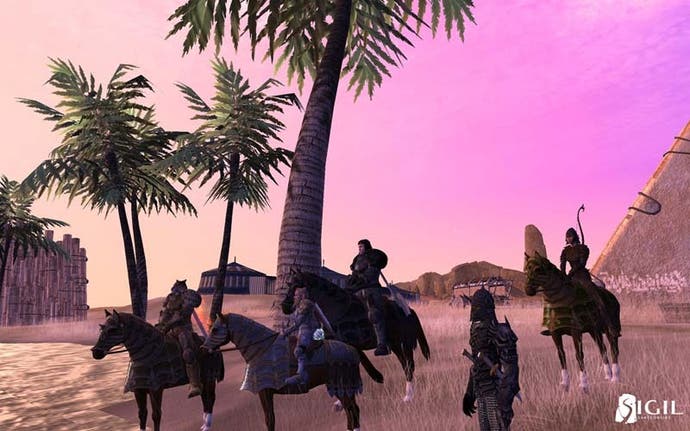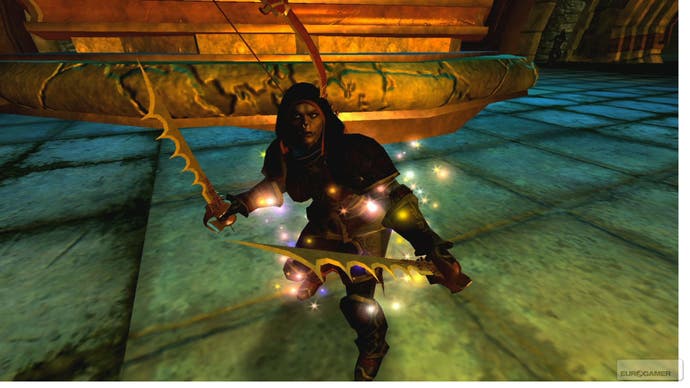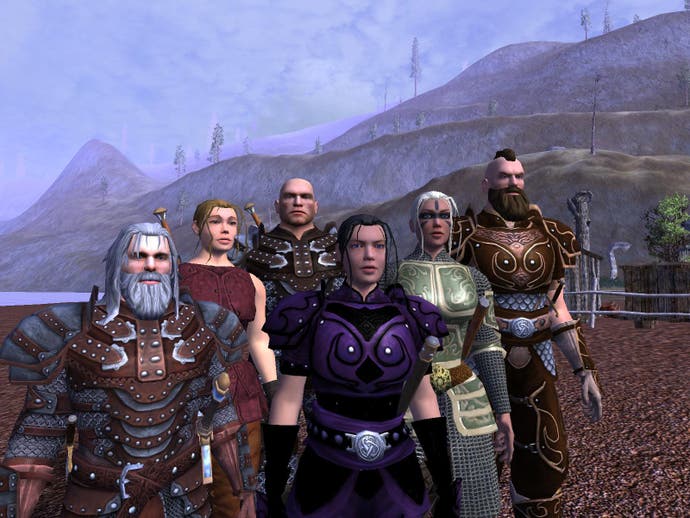Return to Vanguard
A second look at Sigil's unfinished symphony.
So far, so good - and nine months of improvements have definitely polished and fixed the three core spheres of the game to a point where they can actually be enjoyed. Other additions, too, are welcome. Vanguard has adopted World of Warcraft's concept of rested XP, which grants you bonus XP for a time after you've spent a while either logged out or in a settlement, and a new system called Brotherhoods allows you to link up with friends around a similar level and share XP from your activities - even when one of you isn't online. It's a fantastic way of making sure that friends who can't always play together stay around the same level, rather than outpacing one another.
Sigil certainly hasn't been sitting on its hands for the last nine months, then; but it's far from being all roses in the world of Telon. Most of the technical and content fixes are, frankly, what we'd have expected to see from a game launching after a beta period - not from a game that's been on the market and commanding a subscription fee for nine months. Saying that the game is now up to the quality of a polished MMOG at launch is a glass-half-full comment, too - and in other regards, the glass is half empty. Vanguard still presents its fair share of bugs and problems.
Changing the Guard

Some quests, for example, remain badly bugged and cannot be completed - something we encountered in a major part of an ongoing quest chain only a couple of hours after rolling a new character. This wouldn't be such a problem if there were dozens of quests around for you to pick and choose from - but quest and content density remains a pressing problem for Vanguard. Each area has only a small number of quests to choose from, often all strung out along one chain of storytelling; compared to the quest-rich environments of games like WoW, Lord of the Rings Online and their ilk, it feels sparse and barren. The upshot, of course, is that grinding monsters at random is encouraged - an unpleasant throwback to the Bad Old Days.
Similarly, we have a big problem with the town planners of Telon, who have laid out some of the most annoying, spread-out and illogical cities we've ever visited in a game. Most MMOGs trip up on city design at some point - leaving players wandering around wondering where on Azeroth they're meant to be, and feeling increasingly frustrated as they do so - but Vanguard's can be particularly awful, with even small settlements being widely spread out and annoying to navigate. If they were packed with content, we wouldn't mind so much - but, as previously mentioned, many settlements offer you remarkably little to do.
The continent of Kojan, in particular, seems badly conceived; it's one of the three major continents in the game (and Vanguard's vast, sprawling world is certainly one of its biggest assets - each continent is remarkably different from the last), but it's got remarkably little to do, and dries up almost completely at level 20, forcing players to move elsewhere. The other continents are better, certainly, but still afflicted with broadly the same problem - not enough content to fill the wide open spaces.

It's not just content that rattles around in a vacuum, though. Players, too, are thin on the ground - especially in the low-end areas. Sigil has reduced the number of servers for Vanguard from 13 down to 4 in a series of mergers - a fine plan, but each of the four remaining servers still has a low population. It gets better at higher levels, above level 40 or so, but below that you'll frequently have trouble finding anyone to play with - even with the new and improved Looking for Group interface. This isn't Sigil's fault - well, it is, but they can't magic up players out of nowhere - but it's still a major problem with the game, and it would be silly not to factor it into a re-review.
What we're left with, then, is all the evidence of a development team struggling insanely hard to make up for a terribly weak launch. In the past nine months, Sigil have kept their promises; new features have been rolled out, free content updates and patches have appeared every few weeks, problems have been fixed, and as we write this, a much-needed infusion of high-end raiding content is being mainlined into the game. The company is working its backside off to fix the disappointment of last February's launch - of that, we're absolutely certain.

Vanguard is now in a stable and enjoyable state, and much of the potential which was crushed by poor implementation at launch has been unlocked by months of additional development work. For the few players who have stuck with the game, their patience has been rewarded - even if they'd be justified in feeling ripped off at having paid to beta test an unfinished product for nine months.
However, the uphill struggle the game faces may simply be too steep. Conventional wisdom in the MMORPG market says that you can't recover from a bad launch, and Vanguard is already a by-word for poor quality, rushed software in MMOG circles. Even now, it's not bug-free and well-polished - it works, it's innovative and it's well-implemented, but compared to the you-can-see-your-face-in-it shine of something like WoW or LOTRO, it's still second-rate.
More dedicated MMOG fans will be prepared to forgive that, and to them we're happy to say that Vanguard is now ready for its close-up. If you are an old EQ player or in search of something more hardcore than WoW, but you dismissed Vanguard as a ropey old goat earlier in the year, you could do worse than trying it again. However, if WoW is your poison - or if you're unusure about this whole MMOG lark in general - Vanguard should probably stay off your shopping list.


